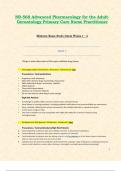1 NR-568 Advanced Pharmacology for the Adult -
Gerontology Primary Care Nurse Practitioner Midterm Exam Study Guide Weeks 1 - 4 Week 1 Things to know about each of the major antibiotic drug classes - Aminoglycosides (Gentamicin, Neomycin, Tobramycin) ‘icin Precautions / Contraindications • Pregnancy: fetal ototoxicity • With other ototoxic drugs: furosemide, minocycline • With nephrotoxic drugs: vancomycin, cisplatin • Elderly patients • Those with kidney disease • Cautious use of muscle relaxants • Do not mix with any other drug in same syringe High Risk Patients • Are allergic to sulfites (often found in certain wines and dried fruits) • Have kidney or hearing problems, including problems with balance and uncontrollable eye movements • Have a disorder affecting the nerves a nd muscles, like multiple sclerosis or myasthenia gravis. • Are 65 years of age or older • You have a newborn or very young baby who might be treated for a serious infection using aminoglycosides - Carbapenems (Doripenem, Ertapenem, Imipenem) ‘ nem Precautions / Contraindications/High Risk Patients Contraindicated in patients with prior allergic reactions to beta lactam antibiotics. Contraindicated in patients with prior adverse reactions to lidocaine. Contraindicated in patients who are taking valproic acid for seizures, as it has been shown to decrease valproic acid concentrat ions by as much as 90% Carbapenems are powerful antibiotics that kill bacteria causing a range of diseases including pneumonia, urinary tract infections, serious skin infections, meningitis, and septicaemia (blood poisoning) 2 Only Given for serious infectio ns Patients who are taking valproate to control seizures should not be placed on Imipenem Dosage should be reduced in patients with renal impairment - Cephalosporins (Cefadroxil, Cefazolin, Cephalexin) ‘ in Precautions / Contraindications/High Risk Patients Contraindicated for patients Hx of allergic reactions to cephalosporins or severe reactions to penicillin Dosage should be reduced in patients with renal impairment Report stool frequency (can promote Clostridiodies difficile infection) - Fluoroquinolones (Ciprofloxacin, Delafloxacin, Lovofloxacin) ‘ xacin Precautions / Contraindications • Previous allergic reaction to Fluoroquinolones • Certain disorders that predispose to arrhythmias (eg, QT -interval prolongation, uncorrected hypokalemia or hypomagnesemia, sig nificant bradycardia) • Use of drugs known to prolong the QT interval or to cause bradycardia (eg, metoclopramide, cisapride, erythromycin, clarithromycin, classes Ia and III antiarrhythmics, tricyclic antidepressants) High Risk Patients • arthritis or problem s with your tendons, bones or joints (especially in children); • diabetes, low blood sugar; • nerve problems; • an aneurysm or blood circulation problems; • heart problems, or a heart attack ; • muscle weakness, myasthenia gravis ; • liver or kidney disease; • a seizure, head injury , or brain tumor ; • trouble swallowing pills; • long QT syndrome (in you or a family member); or • low levels of potassium in your blood ( hypokalemia ). • Do not give this medicine to a child without medical advice. Precautions / Contraindications/High Risk Patients - Glycopeptides & Lipoglycopeptides (Vancomycin, dalbavancin, oritavancin ,telavancin) • Use of glycopeptides and lipoglycopeptides during pregnancy is not reco mmended, but sometimes the benefits of treatment may outweigh the risks. For example, vancomycin taken by mouth may be used to treat C. difficile –induced diarrhea in pregnant women • Patients with history of antibiotic associated diarrhea must be cautious ab out using Vancomycin. Discuss with your doctor regarding your history of the same. • Patients with history of opportunistic infections must be cautious about using Vancomycin. Discuss with your doctor regarding your history of the same. • Patients with history of diminished hearing and ototoxicity are at increased risk for hearing loss with Vancomycin. Discuss with your doctor regarding safety with Vancomycin use. 3 • Vancomycin is not metabolized and is excreted unchanged in the urine. Individuals with compromised renal functions tend to retain the drug in the circulation longer, thus resulting in toxicity. Vancomycin should be avoided or used with extreme caution in such individuals. • Individuals with history of seizures and hallucinations can present with exacerba tion of these symptoms with Vancomycin. Vancomycin should be avoided or used with extreme caution in individuals with seizure history. • Vancomycin should be avoided or used cautiously in individuals with history of cardiac arrhythmias, as it has the potenti al to induce life -threatening cardiac arrest. Individuals with history of chronic disturbance in serum magnesium and potassium ions are at increased risk for arrhythmias. Also, individuals taking Lasix are at increased risk for losing potassium, thus setti ng the ground for life -threatening arrhythmias with Vancomycin. • Vancomycin intake can increase the risk for skin rash, ranging from mild to severe exfoliating rash, easy bleeding, bruising, and blister formation. Individuals with history of extreme skin ra shes and taking Vancomycin should be aware of this response and observe a close watch on the same. High Risk Patients Telavancin has a boxed warning highlighting the increased mortality in patients with preexisting kidney dysfunction (creatinine clearance 50 mL/min or less). Precautions / Contraindications/High Risk Patients - Macrolides (Erythromycin and azithromycin ) ‘mycin Concomitant administration of macrolides with astemizole, cisapride, pimozide, or terfenadine is contraindicated because potentially fatal cardiac arrhythmias (eg, QT prolongation, ventricular tachycardia, ventricular fibrillation, torsades de p ointes ) may occur when clarithromycin or erythromycin is given with these drugs. High Risk Patients • liver disease; • kidney disease; • myasthenia gravis; • a heart rhythm disorder; • low levels of potassium in your blood; or • long QT syndrome (in you or a family me mber). Precautions / Contraindications/High Risk Patients - Monobactams (aztreonam) Aztreonam for injection should be halved in patients with estimated creatinine clearances between 10 and 30 mL/min/1.73 m2 after an initial loading dose of 1 or 2 g. - Oxazolidinones (linezolid & tedizolid) ‘ zolid Precautions / Contraindications -




